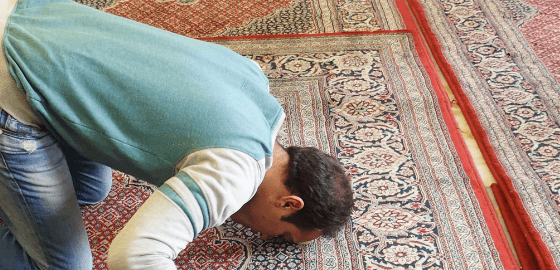True wealth is not in having many possessions, but rather (true) wealth is feeling content in the soul.
Sahih al-Bukhari 6446
In a world too caught up in chasing its own tail, humanity desperately craves something deeper. Amassing wealth is no longer a satisfying goal in life. To some extent, it is necessary for comfort and success, but it does not fulfill every need of the human soul. The need for a greater purpose, and spiritual connection with the Creator, cannot be gained through a life spent in the pursuit of wealth and status. True wealth lies in contentment, a feeling of inner peace with everything God has blessed you with.
True contentment is the sweet spot between apathy and greed. A sincere believer is not lazy in earning an income or providing for the family, but neither is he greedy for everything this world has to offer. He works hard to earn that which is pure, to gain blessed sustenance, and then he is content at the end of each day with what God has blessed him with for that day.
But how do we experience contentment?
What can we do to unlock this powerful and satisfying feeling?
The following steps bring contentment into one’s life, and in the process upgrade the quality of one’s life and mental health in amazing ways.
1. Living for a greater purpose
We were not created to waste life on lustful pursuits. The human soul was designed for a much deeper experience. Allah created us to worship Him i.e. to live a life that is pleasing to Him. It is in the pleasure of Allah that the greatest of joy is experienced.
Those who believe, and whose hearts find comfort in the remembrance of God. Indeed, it is in the remembrance of God that hearts find comfort.
Surah al-Rad 13:28
True comfort of the soul can only be experienced when one’s lifestyle is aligned with the Divine Purpose. It is only when our focus is on pleasing the Creator, and living an Islamic lifestyle that we can begin to taste the sweet fruit of faith. Contentment is a gift to those who live with purpose.
2. Practicing Daily Gratitude
And when your Lord proclaimed: “If you are grateful, I will grant you more; but if you are ungrateful, My punishment is severe.”
Surah Ibrahim 14:7
Allah’s promise is clear and true. The secrets of success are unlocked through a lifestyle of gratitude. It is only when we begin to appreciate the little things in life, the small bounties that we take for granted, that we begin to experience contentment. There is so much that we take for granted in our pursuit of more. But if we were to stop and take time to thank Allah saying Alhamdulillah (All Praise is for Allah) at every little gift, we will attract a higher level of blessings and inner peace into our lives. I discuss this concept in more detail in my latest ebook; Earning Barakah.
3. Keeping one’s earnings pure
It is tempting to take shortcuts, to chase the get-rich-quick scheme, to harm others in the pursuit of more. But any wealth earned in such a manner is devoid of blessings. It is a cursed wealth ruined by bad intentions, ill means, and harmful greed. Even if someone was to amass millions in unlawful gains, they will never taste the sweetness of contentment. Every mountain of gold will only make them desire another.
Blessings come from purity, and purity comes from halal earnings. It is only when we make a firm effort to earn halal, even if it is less, that we unlock blessed sustenance. Blessed sustenance is not necessarily a lot of wealth, or a thriving business. It is any sustenance that suffices the family, and brings one closer to the Creator. The most blessed sustenance of all is contentment.
4. Serving the community
The soul longs for more than just material wealth. Our souls are social in nature, and need to be part of a community. That feeling is not just to belong, but to serve as well. Modern psychology studies have shown that community service cures many forms of depression and loneliness. This is because we tap into the part of our soul that needs to serve.
If the pursuit of this world has left you cold and lonely, then maybe it is time to shift one’s paradigm from consumption to service. When we give back to society, we attract blessings and inner peace into our lives. Taking care of the creation pleases the Creator and opens new doors of blessings. A simple step of taking out time once a week to help others can have a profound impact on one’s mental health, and help build an atmosphere of contentment.
5. Living within one’s means
The need to live large is a lie. We do not need fancy homes, cars, or luxury furniture to be happy. If they are within one’s budget, then there is no sin in indulging, but then too precaution is needed. One of the biggest problems of modern life is that too many of us live off credit cards and loans, convinced that we need that fancy new gadget now, and will figure out a way to pay for it later.
It is very difficult to sleep peacefully at night, when your brain keeps reminding you that you still owe thousands of dollars to others. The guilt and anxiety that a debt-based lifestyle brings wipes away any hope in experiencing contentment and inner peace. The solution then is simply; reduce debt to only that which is necessary. Some debt is unavoidable, but too often we choose to indulge in that which we cannot afford. Yet if we choose to live within our means, we will build a far more relaxed and happy home.
6. Being Afterlife-focused
This world is an illusion, and one day we all will leave it. The pandemic has shown us how short life truly is, and many who used to read this blog a year ago are not gone. Every one of us will one day experience death and return to our Creator. On that day, the wealth we amassed will hold no value. Allah will ask us two things about it, how it was earned and how it was spent. Our focus must be on earning and spending in ways that will reflect positively on the Last Day.
Instead of focusing entirely on wealth-building for this world, we should also put aside some time, money or effort for building the next world. These should be invested in sources of continuous reward (al-thawab al-jariyah) that will pile up good deeds for us long after we have passed away. Contentment comes from knowing you have invested more in one’s Afterlife than in one’s worldly life. My latest book contains an entire chapter on how to build sources of continious reward, get it here.
When the human being dies, his deeds end except for three: ongoing charity, beneficial knowledge, or a righteous child who prays for him.
Ṣaḥīḥ Muslim 1631
7. Trusting God’s Plan
The final step is simply to trust the Creator and His Plan for you. The concept of Tawakul (trusting God) is central to Islamic Spirituality. I have written many articles about this concept in the past. It is crucial for maintaining contentment and inner peace in this world.
A life of tawakul means a life of working hard, while trusting God’s Plan, and accepting the results of one’s efforts as what is best for you. It means living life with a strong wroth ethic, combined with inner peace and contentment. When you trust Allah, you will never be disappointed. Allah’s plan is best and that is enough for us.
Whoever is conscious of Allah, He will make a way out for him. And He provides for him from (sources) he never could imagine. And whoever puts his trust in Allah, sufficient is (Allah) for him. For Allah will surely accomplish his purpose.
Surah al-Talaq 65:2-3
To gain a deeper spiritual connection with blessed sustenance, check out our latest ebook “Earning Barakah” available here.





